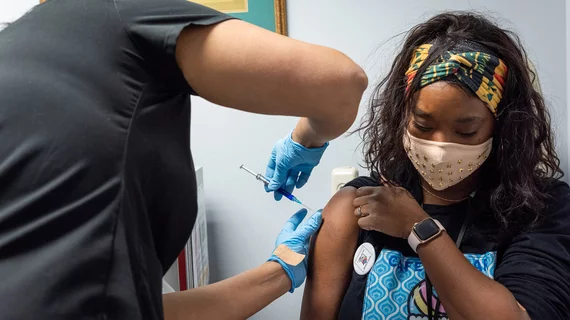FDA committee backs Novavax's COVID-19 vaccine despite heart damage concerns
The U.S. Food and Drug Administration (FDA) appears to be one step closer to approving Novavax’s protein-based COVID-19 vaccine, NVX-CoV2373. The news comes days after the agency shared detailed information on a small number of trial participants developing myocarditis or pericarditis after receiving the vaccine.
The FDA’s Vaccines and Related Biological Products Advisory Committee (VRBPAC) voted to recommend an emergency use authorization (EUA) for the two-dose vaccine on June 7. The vote was 21-0, with a single committee member choosing to abstain.
“In today's VRBPAC meeting, we heard the overwhelming support for our vaccine from physicians, healthcare organizations and consumers who are eagerly anticipating a protein-based vaccine option,” Stanley C. Erck, president and CEO of Novavax, said in a statement. “Consistent with submissions to regulatory authorities worldwide, we have already submitted an amendment with updated manufacturing information for the EUA to the FDA for review. We look forward to collaborating with the FDA as it makes its final decision.”
The committee’s decision was based partly on results from the PREVENT-19 trial, which were published in the New England Journal of Medicine back in February 2022.
“NVX-CoV2373 was safe and effective for the prevention of COVID-19,” the study’s authors wrote at the time.
The FDA’s final decision is expected within days. While it typically follow’s recommendations made by the VRBPAC, this is not a given.
Is the Novavax COVID-19 vaccine associated with a risk of myocarditis, pericarditis or other cardiac events?
In an 80-page briefing document, the FDA noted that six cases of myocarditis/pericarditis were seen in patients receiving the vaccine. These cases, the agency wrote, are “of particular interest” and “similar to myocarditis following mRNA COVID-19 vaccines.” Four patients were young men; the remaining two patients were a 60-year-old woman and 67-year-old man. Five of the six patients were hospitalized.
One case of myocarditis was also seen in a 31-year-old woman who received a placebo.
In addition, the FDA highlighted other potential cardiovascular concerns in its briefing document.
“Review of the data also identified small imbalances in certain thromboembolic events, including cardiac and neurovascular events, hypersensitivity events, cholecystitis, uveitis, cardiac failure and cardiomyopathy,” according to the agency “However, a causal association between vaccination and these events cannot be concluded based on available data. Subgroup analyses of safety data did not reveal any notable differences across demographic groups.”
Novavax issued a separate statement about these concerns.
“We have learned that we can expect to see natural background events of myocarditis in any sufficiently large database, and that young males are at higher risk,” according to the statement. “Myocarditis is most often caused by nonspecific viral infections. The data from our placebo-controlled studies show that overall, in our clinical development program, the rate of myocarditis was balanced between the vaccine and placebo arms. Furthermore, in the post-crossover portions of our studies, the cases we have seen are all within the expected rate.”
A Familiar Side Effect of COVID-19 Vaccines
The potential risk of vaccine-related myocarditis has been a popular topic throughout the COVID-19 pandemic. Similar to the current discussion focused on the Novavax vaccine, for example, the Pfizer-BioNTech vaccine was also linked to a low risk of myocarditis—but the risk of COVID-related myocarditis was consistently found to be much higher.

